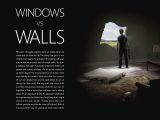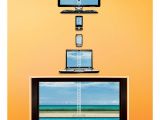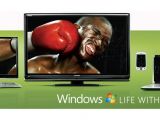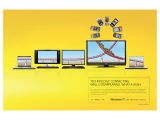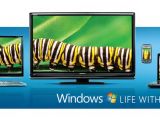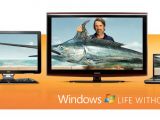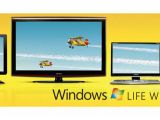Microsoft is without a doubt diversifying the collection of resources behind the new $300 million Widows marketing campaign created by advertising agency Crispin, Porter + Bogusky. From Bill Gates and Jerry Seinfeld's the Future Is Delicious to I'm a PC; Windows vs. Walls; Life Without Walls; the fake “I'm a PC Guy” John Hodgman (aka Sean Siller, senior program manager for networking in the Windows Core Operating System Division), the Redmond giant is evolving along its initial Free the People strategy designed to tell the truth about Windows. The first signs of Microsoft clearing its voice in the market were delivered by Brad Brooks, corporate vice president, Windows Consumer Product Marketing as early as the start of June 2008.
The Windows Brand vs. the Windows Products
“Windows has always been about putting the power of computing in the hands of people. All of these efforts are designed to reconnect and re-ignite our customers’ imaginations around the value of Windows in their lives today, and the promise of Windows in their lives tomorrow,” explained Bill Veghte, Senior Vice President, Online Services & Windows Business Group with the initial launch of the Windows campaign on September 4.
Microsoft is laboring to span Windows across various segments of the consumer market, delivering a segmentation in relation to the PC, to mobile phones and to the Cloud. In this manner, the Redmond company is elevating the Windows brand above the products that it is inherently associated with. Designed as a subtle divorce between Windows and the underlying software solutions or cloud services, the strategy is to make the brand independent of any product.
While the Windows brand has indeed suffered because of competitors such as Apple, the fact is that it has also been hurt by Microsoft itself. The Redmond giant can go head over heels with multi-million marketing campaigns but it won't change the fact that Windows Vista as a product has eroded the Windows brand. At the same time, the company's modest positioning on the operating system market for mobile phones, coupled with the confusing soup of applications and services between MSN and Windows Live for the past years, has also impacted the value of Windows, at a conceptual level.
Traditionally, the brand functions as a representation of the quality and experiences delivered by a product. But Microsoft is not connecting Windows with any specific product, not even with Windows Vista. The fact is that the marketing campaign is not telling consumers to crowd the stores for a must-have operating system, or mobile phone, or to burn their broadband connections downloading Windows Live Wave 3. In this sense, the campaign continues to be about nothing, much as the initial Seinfeld and Gates commercials, while pushing Windows as a ubiquitous, universal concept.
Still, Microsoft is indeed advertising the Windows brand. The company is actually creating a new feeling for consumers acquiring anything with a Windows logo on it. A feeling that they are part of a global community of over 1 billion people, and that they should be proud of this status, proud of having choices beyond anything any platform worldwide can offer, of their individuality, of the fact that stereotypes exist only in one-sided conversations, and not when they make their voices heard.
Reaction vs. Action
“Imagine no walls,” reads an invitation from Microsoft. “Where you connect to a global community of more than a billion people and nothing comes between you and a world of ideas and opportunities. With Windows on your mobile phone, PC, or the web, walls begin to disappear—at home, at the office, and anywhere in between. You can balance work and life as well as fun and functionality. And with a wide range of software, services, and devices to choose from, your technology can be as unique as you are. That's Windows. Life without walls.”
Make no mistake about it. Microsoft has finally come out gunning for Apple, long-overdue moment, perhaps even as much as the delivery of Windows XP Service Pack 3. The damage delivered by the Cupertino-based hardware company to Microsoft's products and brands has forced the Redmond giant to dig deep into its pockets and caught up a reported but unconfirmed $300 million for Windows advertising in a year when there isn't a new iteration of the operating system launch. By comparison, Microsoft spent $500 million on the Windows Vista release at the end of January 2008. Now the ball is in Apple's court. Apple is reduced to reacting, because it is obvious that as Microsoft has turned the I'm a PC weapon against the Cupertino-based hardware company, the traditional “get a Mac” ads will no longer do the trick.
Windows vs. Walls
“This epic struggle explains why we make what we make and do what we do. The thing that gets us out of bed every day is the prospect of creating pathways above, below, around and through walls. To start a dialogue between hundreds of devices, billions of people and a world of ideas. To lift up the smallest of us. And catapult the most audacious of us. But, most importantly, to connect all of us to the four corners of our own digital lives and to each other. To go on doing the little stuff, the big stuff, the crazy stuff and that ridiculously necessary stuff. On our own or together. This is more than software we're talking about. It's an approach to life. An approach dedicated to engineering the absence of anything that might stand in the way... of life. Today, more than one billion people worldwide have Windows. Which is just another way of saying we have each other,” Microsoft reveals.
Microsoft vs. Apple – PC Guy is slapping Mac Guy in the face. Can you see it?
One Microsoft ad was sufficient to shatter the Apple I'm a PC Guy stereotype. The test is simple. Watch Microsoft's “I'm a PC” bits embedded at the bottom of this article and then go ahead and watch a recently introduced Apple ad in the NY Times. The fact is that the Get a Mac video ads have lost their edge, they are no longer as smart, as funny, as appealing, as ironical as they used to be. All of a sudden, Apple has been downgraded to nothing more than an elitist and snobby joggler with cheap marketing tricks up its sleeve.
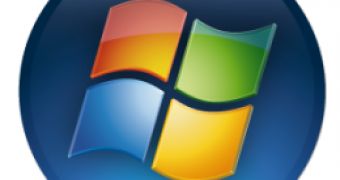
 14 DAY TRIAL //
14 DAY TRIAL // 




